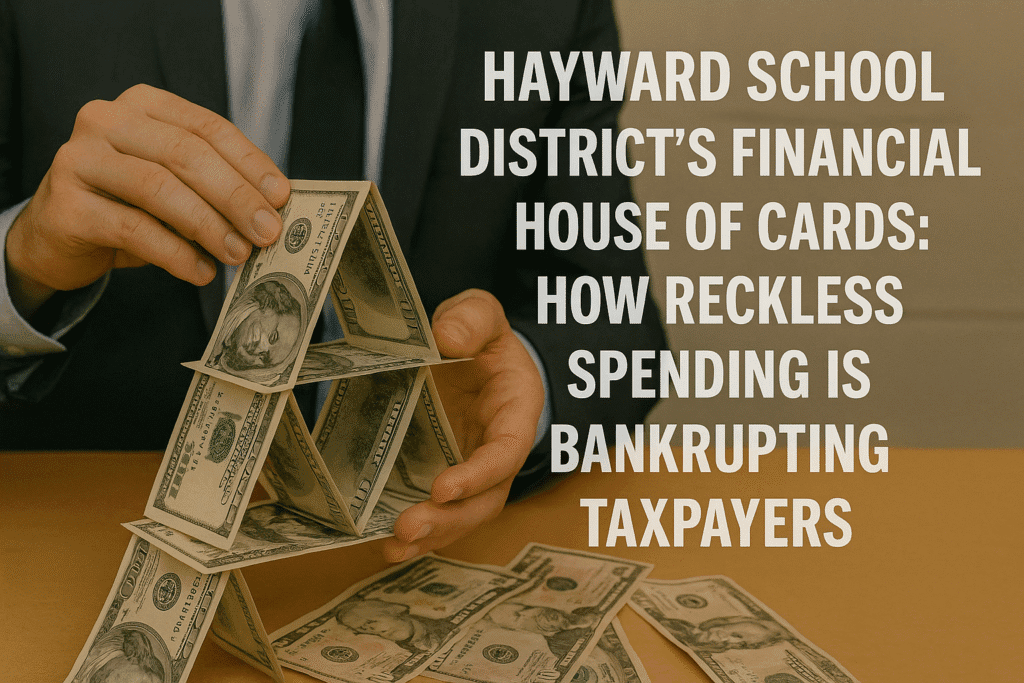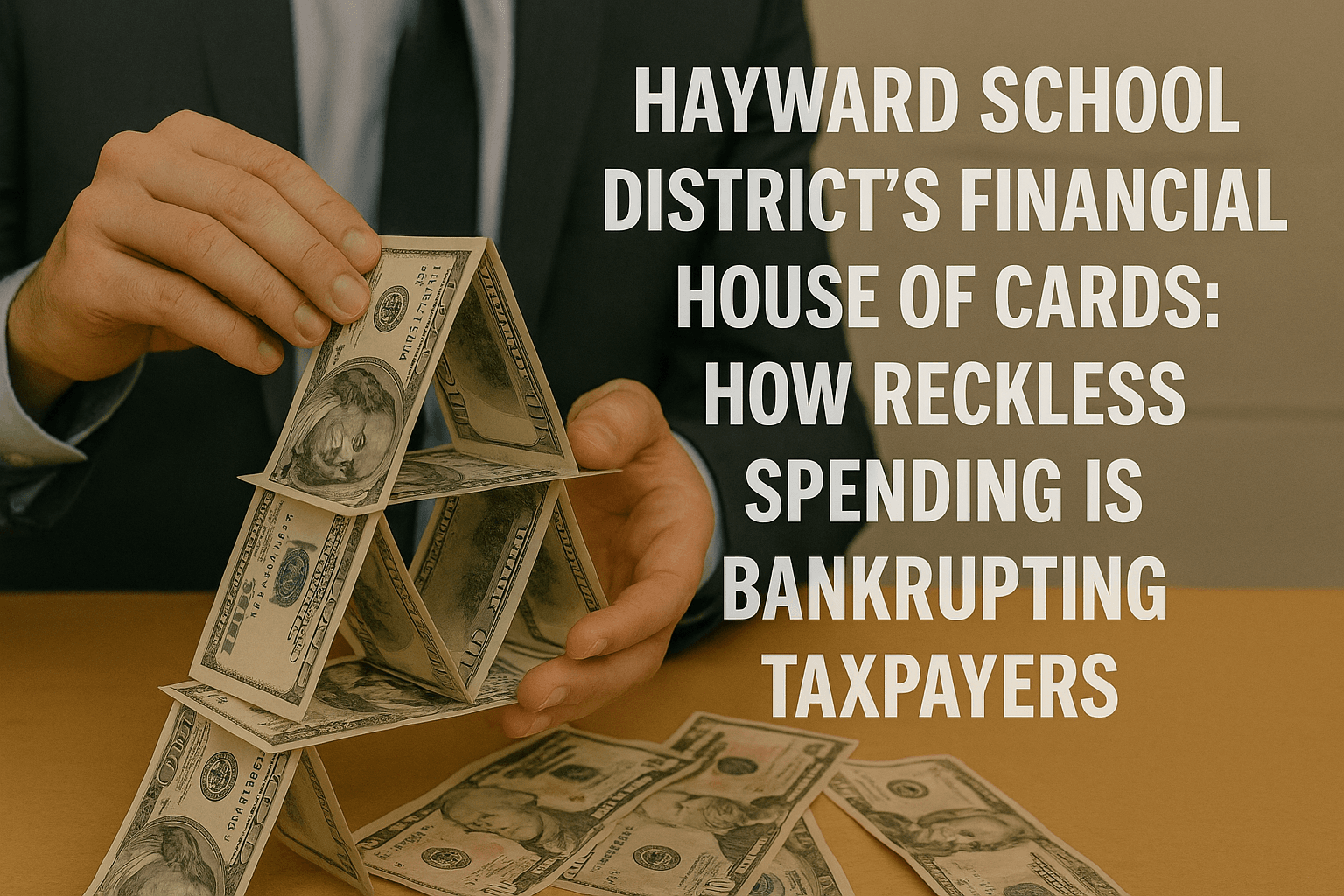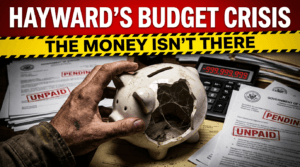Hayward School District’s Financial House of Cards: How Reckless Spending Is Bankrupting Taxpayers


HUSD continues deficit spending while administrators collect six-figure salaries and kick the budget crisis down the road
The writing is on the wall at Hayward Unified School District, but administrators seem determined to ignore it. Despite clear warnings of fiscal disaster ahead, HUSD continues its reckless spending spree while promising taxpayers that somehow, someday, they’ll figure out how to balance the books.
The district’s own budget documents paint a picture of financial mismanagement that would make even the most liberal California politician blush. Yet Superintendent Chien Wu-Fernandez and her administrative team continue drawing hefty paychecks while the district careens toward insolvency.
The Deficit Spending Addiction
HUSD’s June 2025 budget adoption meeting contained a stunning admission buried in bureaucratic language: “we do expect that there will be a need for the Board to take action to implement ongoing budget solutions due to the fact that we have positions funded with one-time revenues that are due to expire this upcoming year, as well as the fact that we are continuing to deficit spend.”
Let that sink in. The district is admitting it’s spending money it doesn’t have while funding permanent positions with temporary revenue sources. This isn’t fiscal responsibility — it’s financial Russian roulette with taxpayer dollars.
The administration’s “solution”? Kick the can down the road. They’ll return to the board in September 2025 with “recommended amounts needed for budget solutions,” then come back in February with “recommendations for spending reductions.” Translation: we’ll keep spending recklessly until we absolutely can’t anymore.
The Administrative Gravy Train Keeps Rolling
While promising future cuts, HUSD had no problem approving new administrative positions and hefty contractor payments. The June 2025 meeting included approval for:
- A new Assistant Superintendent of Student and Family Services contract through June 2027
- Over $9 million in special education contractor agreements
- Millions more in consulting and professional service contracts
Where’s the belt-tightening? Where’s the sacrifice from the administrative class that created this mess?
Let’s examine the compensation reality at HUSD:
Superintendent Chien Wu-Fernandez:
- Base salary: Likely $250,000+ annually
- Benefits (35% of salary): $87,500+
- Total annual compensation: $337,500+
- Hourly rate (based on 2,080 hours): $162+
Assistant Superintendent positions:
- Estimated base salary: $200,000+ annually
- Benefits: $70,000+
- Total annual compensation: $270,000+
- Hourly rate: $130+
Compare this to Hayward’s median household income of approximately $85,000. These administrators are making 3-4 times what the average family earns while running the district into financial ruin.
The One-Time Revenue Shell Game
HUSD’s budget crisis stems partly from a dangerous practice: using one-time revenues to fund ongoing positions. This is like using your credit card to pay your mortgage — it might work temporarily, but it’s guaranteed to end in disaster.
The district has been propped up by:
- Federal COVID relief funds (now expiring)
- One-time state grants
- Bond measure proceeds (restricted to facilities)
- Other temporary funding sources
As these revenue streams dry up, HUSD faces a stark choice: eliminate positions or find permanent funding. Given the administration’s track record, guess which option they’ll choose?
The Maintenance Assessment District Money Grab
While claiming budget constraints, HUSD continues extracting money from property owners through the Maintenance Assessment District (MAD). The June 2025 meeting approved continuing the $28.00 per single-family equivalent assessment, generating an estimated $1,368,696 annually.
This assessment, approved by a mere 51.4% of weighted ballots back in 1997, continues to drain money from homeowners for “maintaining and improving school grounds.” Yet the district can’t maintain fiscal responsibility in its own operations.
The Bond Measure Bait and Switch
HUSD successfully convinced voters to approve Measure I, authorizing $550 million in bonds for facilities improvements. The first issuance of $60 million was completed in April 2025, with taxpayers on the hook for decades of debt service.
Here’s the problem: while HUSD claims these bonds are for critical infrastructure needs, the district simultaneously wastes millions on administrative bloat and contractor agreements. Taxpayers approved bonds for classrooms and safety improvements, not to subsidize fiscal mismanagement.
The district even boasted about refinancing previous bonds, claiming $4.7 million in “taxpayer savings.” But what good are refinancing savings when the district continues deficit spending on operations?
The California Spending Disease
HUSD’s fiscal crisis reflects a broader problem plaguing California school districts: the belief that taxpayers are an endless ATM machine. Administrators have become addicted to ever-increasing budgets, regardless of student outcomes or fiscal sustainability.
The district’s 2025-2026 budget shows total expenditures of $37,368,365.52 for May 2025 alone. That’s over $400 million annually for a district serving approximately 17,300 students — roughly $23,000 per student before factoring in additional revenue sources.
Where is this money going? Certainly not to classroom instruction, given the massive reliance on outside contractors for basic services.
The Accountability Vacuum
Perhaps most troubling is the complete lack of accountability for this fiscal mismanagement. Board meetings treat multi-million dollar budget deficits as routine agenda items, with no demands for explanations or consequences.
Board President Peter Bufete and his colleagues rubber-stamp spending while offering platitudes about “serving students.” Meanwhile, the real victims — taxpayers and students — watch helplessly as their money disappears into the administrative black hole.
The Coming Reckoning
HUSD’s financial house of cards is built on:
- Deficit spending with no end in sight
- Temporary revenues funding permanent positions
- Administrative bloat consuming resources
- Contractor dependency draining millions
- Board oversight that’s non-existent
When the inevitable crash comes, administrators will blame “insufficient state funding” or “unforeseen circumstances.” They’ll demand more taxes, more bonds, more sacrifice from everyone except themselves.
What Taxpayers Can Demand
Before HUSD returns in September with their latest budget “solutions,” taxpayers should demand:
- Immediate administrative salary freezes until the budget is balanced
- Elimination of non-essential administrative positions starting at the top
- Comprehensive audit of all contractor agreements and spending
- Public accountability sessions where administrators explain their failures
- Binding commitments to end deficit spending within two years
The Real Cost to Families
HUSD’s fiscal irresponsibility isn’t just about numbers on a spreadsheet — it’s about real families struggling with California’s crushing cost of living while watching their tax dollars disappear.
Every dollar wasted on administrative bloat is a dollar not spent on classroom instruction. Every contractor agreement that could have been an internal hire represents a failure of leadership. Every deficit spending decision pushes the eventual reckoning onto future taxpayers.
The Bottom Line
HUSD’s budget crisis isn’t the result of insufficient funding — it’s the predictable outcome of years of fiscal recklessness and administrative incompetence. While Superintendent Wu-Fernandez and her team collect six-figure salaries, they’ve created a financial disaster that will burden taxpayers for decades.
The September budget “solutions” meeting will be a test of whether HUSD’s board has any backbone left. Will they finally hold administrators accountable, or will they continue enabling this fiscal madness?
Taxpayers deserve better than empty promises and bureaucratic excuses. They deserve a school district that can perform basic functions like balancing a budget without mortgaging the future.
Until HUSD’s leadership takes responsibility for their failures, families will continue paying the price for administrative incompetence. The question isn’t whether this fiscal house of cards will collapse — it’s whether taxpayers will demand accountability before it’s too late.
Sources: HUSD 06_11_25 Board of Education Meeting.pdf, HUSD 06_25_25 Board of Education Meeting.pdf













